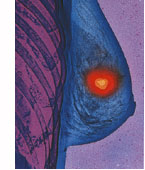|
Data support an important role
for TP53 in mammary carcinogenesis
(Breast Cancer-May 6, 2003)
"The TP53 gene (p53) is found
altered in breast carcinomas in approximately 20% - 40% of all cases depending
on tumor size and stage of the disease," scientists in Norway report.
"It seems to be an early event in breast tumorigenesis. Several
polymorphisms in the TP53 gene have been detected and their possible roles
in breast cancer risk and association to type of cancer developed are
discussed," wrote A.L. Borresendale and colleagues, Norwegian Radium
Hospital, University Hospital. Borresendale and colleagues, Norwegian Radium
Hospital, University Hospital.
"The different mutation spectra seen in geographical and ethnic populations
may be used to identify environmental exposure contributing to breast cancer
development," the researchers wrote.
The researchers concluded: "The role of TP53 mutation as a prognostic marker
is reviewed as well as its role as a predictor for therapy response. All
data available on TP53 mutation analyses of human breast carcinomas, as well
data from transgenic animal studies and experimental cell studies, support
an important role for TP53 in mammary carcinogenesis."
Borresendale and colleagues published their study in Human Mutation (TP53
and breast cancer. Hum Mutat, 2003;21(3):292-300).
For more information, contact A.L. Borresendale, Norwegian Radium Hospital,
University Hospital, Institute for Cancer Research, Department of Genetics,
N-0310 Oslo, Norway.
The information in this article comes under the major subject area of
Oncology. This article was prepared by Cancer Weekly editors from staff and
other reports.
ęCopyright 2003, Cancer Weekly via NewsRx.com & NewsRx.net
|